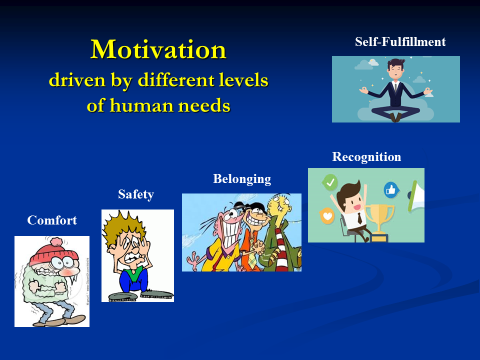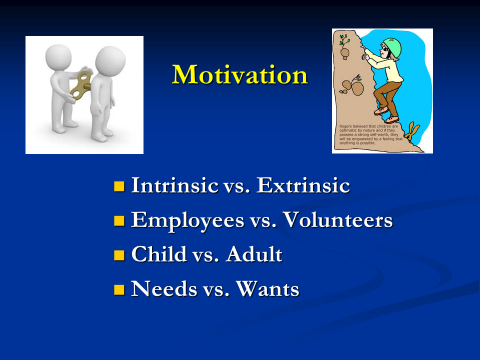
Motivation
– Musings of Dr. Jamie C. Hsu, 12.18.2018
Recently, I was involved in training some young students and in advising several community organizations. We discussed how to motivate young kids to attend summer school and how to motivate volunteers to give their personal time for the good of the community.
Although school teachers and bosses may use the carrot-and-stick approach to motivate others, that can only go so far. According to research on basic human needs, people need to take care of their physiological needs first to survive. Then they need to feel safe, secure and loved, and have a sense of belonging to get motivated. You can see that most clearly in the actions and behaviors of infants and toddlers. When we get older or have satisfied our most basic needs, then our motivation comes from a sense of accomplishment and recognition. Both kids and adults seek reward, praise, and affirmation. Most of the motivational how-to books focus primarily on the social and recognition aspects of motivation that happen in schools and workplaces.
In a volunteer organization where no one gets paid, the leaders can’t punish or reward people using physiological needs and security as levers. Therefore, the most effective way to motivate people is to provide an environment where they can have a sense of belonging and be recognized for their accomplishments. Social gatherings, forums, newsletters, annual reports, and social media postings are some of the ways to get people connected and recognized.
More importantly, we should not just rely on extrinsic factors such as rewards, recognition, or titles to motivate people. We must tap into the intrinsic motivators we all possess, such as learning, curiosity, love, discovery, morality, and self-fulfillment. The power of these intrinsic motivators is endless and self-generating.
Actually, these intrinsic motivators are what babies have. They strive to learn, to crawl, to walk, to speak, and to discover. They do this for their own fulfillment and joy. These intrinsic motivators make us adults and valuable human beings. We just need to rediscover that ability and become passionate volunteers and valuable members of society.
Let us tap into all levels of our individual motivators to become the best we can be and fulfill our own dreams.


激勵
-作者 許俊宸博士
-中譯 薛乃綺
最近,我參與了一批年輕學子的培訓計畫,並且當了一些社區組織的顧問。我們討論到如何激勵年幼的孩子們去參加學校的暑期課程,或者鼓勵義工們為了社區利益來貢獻自己的個人時間。
儘管學校老師或企業老闆會用棍棒(處罰)和胡蘿蔔(獎賞)作為激勵的因素,但這種效果也只能到此為止。根據對人類基本需求的研究,人們需要先照顧自己的生理需求才能生存,然後才會需要安全、穩定、被愛,而且要有歸屬感後才能獲得激勵。這些需求可以很清楚地從寶寶跟小孩子的行為舉止上看到。當我們逐漸長了年紀或者已經對於最基本的需求滿足時,我們的激勵或許會來自成就感和認同感。事實上,不論是孩童或是成人,都會尋求獎勵、讚美和肯定。大多數教人如何激勵的書籍,主要都是關注發生在校園及職場裡有關社交面與認知層面的激勵。
對於每個人都是志願者,而且不支薪的義工團體而言,領導者無法以生理或安全需求作為槓桿來進行獎懲。所以說,激勵人們最有效的方式,是提供一個讓他們有歸屬感並且会被認可的環境。有很多方法,譬如社交聚會、論壇、新聞資訊、年報以及社交媒體發布等,都可以讓人們交流、被認可和赏识。
最重要的是,我們不應該只是仰賴像是獎勵、表彰或頭銜等外在因素來激勵他人。我們必須利用每个人自己所擁有的內在激勵因素,例如說志向、好奇心、愛、發現、道德及自我實現等。這些來自內在的力量是無止盡、而且是与生俱来,自己產生的。
其實,這些內在的激勵因素,是源自我們嬰兒時就有的特性,会不停的去努力爬行、走路、說話和發覺;那時候這樣做,是單純為了自我的滿足與快樂。而這些內在動力使我們長大成人、成為有價值的人。我們只需要再重新發掘這種能力,就会使自己成為一個充滿熱情的志工,以及社會上的寶貴成員。
讓我們各自升華,進入这自主激勵的高層面,使自己成為最理想的成员、並且實現个人的夢想。


